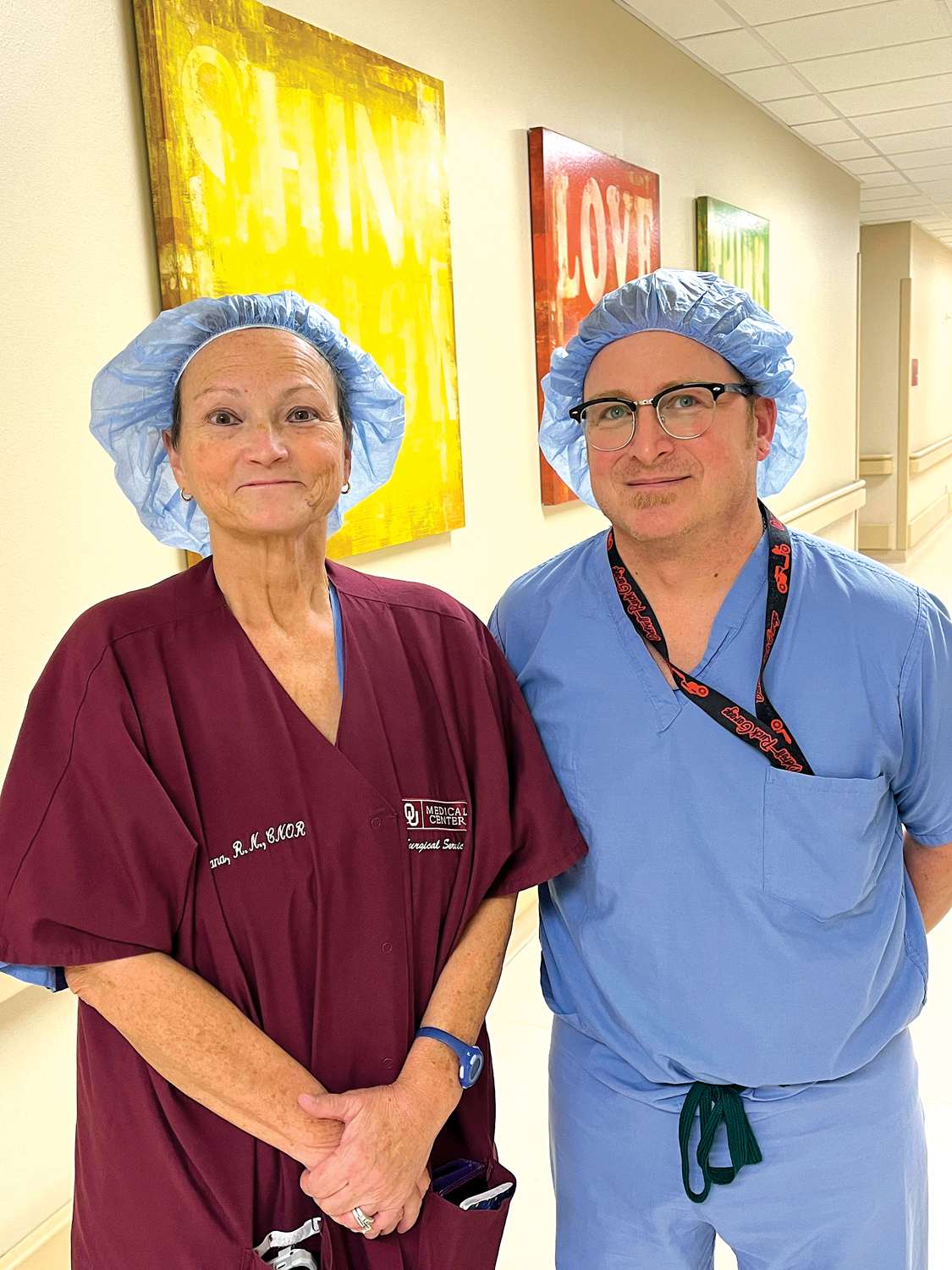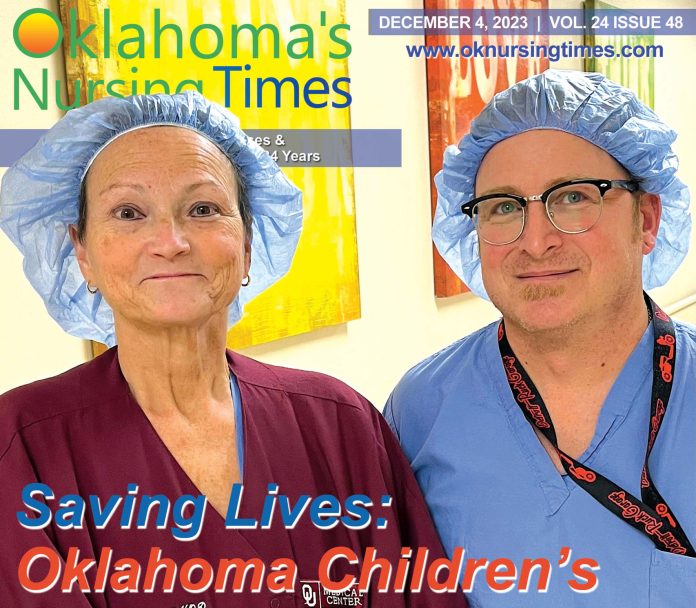
Dana Adams, RN and Randy Stroud
Neurosurgery OR at Oklahoma Children’s Hospital OU Health
story and photo by James Coburn, Staff Writer
Dana Adams, RN, knows why she became a nurse and has been grateful to help children ever since she graduated from nursing school.
“I feel it’s rewarding getting to help them,” said Adams, who is part of the neurosurgery operating room team at Oklahoma Children’s Hospital OU Health, located in Oklahoma City.
In 1991 Adams earned her Bachelor of Science in Nursing degree at the Fran and Earl Ziegler College of Nursing. She worked as a CNA at the hospital’s neonatal intensive care unit before graduating from nursing school. (story continues below)
Become a Healer – We are Hiring – Norman Regional Medical Center
She sees a lot of children living with hydrocephalus, a neurological disorder caused by an abnormal buildup of cerebrospinal fluid in the ventricles deep within the brain. This excess fluid causes the ventricles to widen, putting harmful pressure on the brain’s tissues.
“These kids come back routinely through their lives,” she said. “We do a lot of brain tumors, brain or spine.”
Parents will sometimes come into the OR while their child is receiving anesthesia. Not every child except those depending on their stress level will be given a sedative to help them relax prior to surgery. Some children may have special needs, said Randy Stroud, a neuro surgical technician. Each child is different as the nursing team does what they can to keep them calm.
“We interact with them and try to make them comfortable,” Adams continued.
She and the team explain to parents the process of their child’s surgery, including the intravenous injections, lines, and Foley catheter. Children who are age appropriate are also educated about how the process will help them. Adams said it’s best not to spring something on a kid.
“You want them to be aware, to know,” Adams said.
Following surgery children are awakened just enough for a neuro check to examine their movements. Adams and Stroud say that saving a child’s life and helping children to live a better life is why they accepted their calling in health care.
“We like surgery, we like helping people, we like working with kids,” Adams said.
Stroud said the neuro team has so much in common that they often finish each other’s sentences during a surgery. They have worked together so long and so well that they are always aware of what other team players are doing.
“It’s nice to have a partner,” said Stroud, who graduated from surgical tech school at Wes Watkins Technology Center in Wetumka. He joined Oklahoma Children’s Hospital OU Health in 1996.
He had initially wanted to earn a living as a musician. But like the synchronicity of a fine tune, he found a proper tempo and rhythm in life as a nurse tech. Health care is also a stable career choice to depend on, he said.
“The evolution of neurosurgery — the machines we used when we started to what we use now is amazing,” Stroud said.
A cavitronic ultrasonic surgical aspirator (CUSA) is a suction device that helps surgeons remove pediatric brain tumors. The CUSA uses ultrasonic sequences to emulsify the tissue. What was once a big, gigantic machine rolled into an operating room has been replaced with technology inside a small box. In addition, robotic surgery has simplified the insertion of screws into the spine, Stroud said.
Another procedure is known as cranioplasty, involves neurosurgeons peeling back layers of the scalp to custom implant bone remnants into the proper cranial location. Adams said the procedure often expands room for a healthy brain to grow.
“It’s usually a combo case with a plastic surgeon and a neurosurgeon. So those are pretty cool,” she said.
The operating room is made to provide a relaxed environment for the medical staff’s focus. Music may fill the room.
Adams said she has always been intrigued with the human body and how it works. She inspired others along her career path. Her mother opted for a nursing career after Dana became one.
“I’ve always liked it,” she said.
A nurse working in the operating room needs to be a quick thinker and strong willed in order to be a patient advocate, Adams said. Do your job without taking anything personal, said Stroud.
Stroud said the surgeries he had as a child left him mortified. The experience has helped him to be more empathetic in his career.
“You can’t scare a child. You have to comfort them,” he explained.
His surgery in 1977 would be a better experience today if performed by the caring staff at Oklahoma Children’s Hospital OU Health, he said.
Adams said she admires the resilience children bring to a fast recovery.
Both Adams and Stroud take time to make the best of their own lives. Stroud loves to ride his motorcycle to release stress. And Adams has two children who keep her busy.
For more information about Oklahoma Children’s Hospital OU Health or to coin the team visit https://www.ouhealth.com/careers/.













